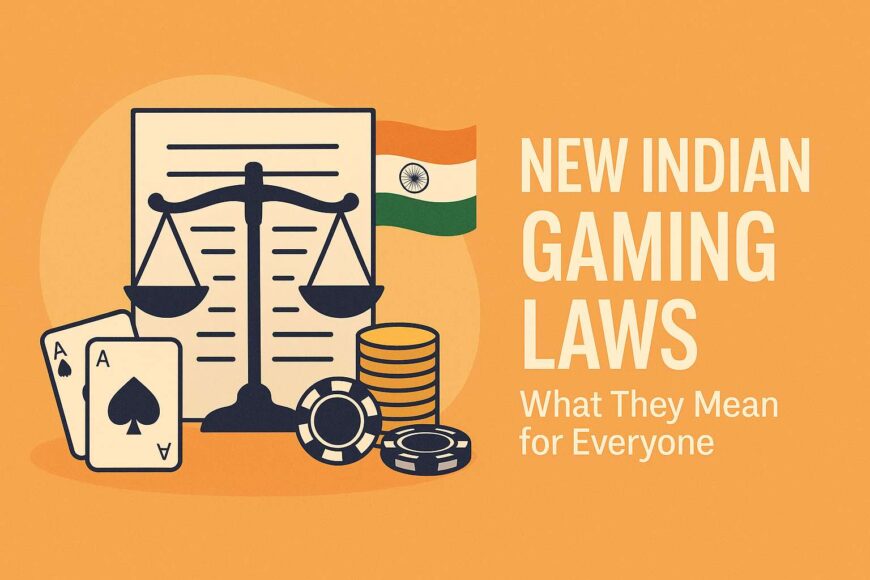New Indian Gaming Laws: What to Expect

India’s online gaming industry is booming, with millions of players engaging daily in games like rummy, poker, fantasy sports, and slots. However, the legal framework governing this fast-growing sector is still catching up. As real-money gaming becomes more popular, lawmakers at both the central and state levels are taking notice. New regulations are now on the horizon that could significantly reshape how platforms operate and how players access and enjoy these games. While the central government is working toward a unified regulatory structure, many Indian states are implementing their own rules—including outright bans, mandatory licensing, and strict compliance requirements.
For both players and operators, the key question is: What could these upcoming legal changes mean in practice—and who will be affected the most?
What’s Changing in Indian Gaming Law?
India doesn’t currently have a unified legal framework for online gambling and betting. Instead, most regulations still rely on the outdated Public Gambling Act of 1867, which was designed for physical gaming establishments and never anticipated the rise of digital platforms. Since gambling is legally a state subject, each Indian state holds the authority to decide whether to permit, regulate, or prohibit different forms of online gaming. This has resulted in a highly fragmented legal landscape, where rules vary drastically between regions. In some states, skill-based games like rummy or fantasy sports are allowed; in others, they’re banned outright.
However, this long-standing ambiguity may soon shift. With central authorities stepping in and states proposing their own digital-era laws, India’s online gaming environment is entering a critical phase of transformation. Here’s what you need to know:
1. Central Push for Uniform Regulation
The Ministry of Electronics and Information Technology (MeitY) has amended the IT Rules 2021 to define online real-money games and require platforms to:
- Verify users with KYC.
- Appoint compliance officers in India.
- Register games with a self-regulatory body.
- Prohibit games that cause addiction or financial harm.
Although not a full gambling law, these rules are the first national-level attempt to bring order to the space.
2. GST Council Steps In
The Goods and Services Tax (GST) Council ruled in 2023 that all online games involving real money—whether skill or chance—will be taxed at 28% on full face value. This has already impacted platforms financially, and players may see reduced bonuses or higher entry fees.
3. States Are Taking Action Too
Several states are tightening their stance:
- • Tamil Nadu banned online rummy and poker, even as the High Court allowed Aadhaar checks for age verification.
- • Karnataka is drafting new rules to regulate skill-based games and ban chance-based betting.
- • Uttar Pradesh and Maharashtra are pushing the central government to create a strict national law to curb gambling addiction and scams.
Impact on Players
For Indian players, these legal changes bring both protection and restrictions. On one hand, stricter KYC rules, regulatory oversight, and licensed operators mean a safer, more transparent environment for gameplay. Players can expect fewer scams, better dispute resolution, and more confidence in where they spend their money. On the other hand, rising tax burdens, game restrictions, and varying state laws may limit access, reduce bonus offers, or increase the cost of participation over time.
✅ What’s Good
- More safety: With KYC rules and self-regulation, platforms will need to be more transparent.
- Less fraud: Verified operators are likely to dominate, reducing scams.
- Clearer rules: A national framework would eliminate the confusion between states.
⚠️ What’s Concerning
- Fewer game options: Games of chance may be banned or heavily restricted.
- Higher costs: GST at 28% may mean smaller rewards or increased charges.
- Location-based restrictions: Some states may still block access to popular platforms.
Impact on Operators
Online casinos and gaming platforms operating in or targeting India must now rethink compliance from the ground up. With evolving regulations, tax obligations, and state-specific restrictions, businesses can no longer rely on a one-size-fits-all model. Staying ahead requires legal awareness, local adaptation, and a commitment to responsible, transparent operations across all jurisdictions.
- Must conduct full KYC for all real-money players.
- Need to register with a self-regulatory body to be classified as legal.
- Prepare for 28% GST on all deposits or entry fees.
- Monitor state-level bans and react quickly to legal changes.
- Adjust advertising and influencer campaigns to avoid misleading promotions.
Operators who fail to comply could face bans, penalties, or even criminal charges.
What’s Next?
Looking ahead, the Indian government is actively exploring the introduction of a comprehensive national framework to regulate online gaming. The aim is to replace the current fragmented system with unified rules that apply consistently across all states. This proposed legislation could include a central licensing authority, standardized taxation policies, and clear definitions for different types of games—particularly those involving real money. It may also mandate responsible gaming practices, such as time and spending limits, player verification through Aadhaar or other KYC processes, and mechanisms to report and resolve disputes. While the Ministry of Electronics and Information Technology has already taken preliminary steps through amendments to the IT Rules, industry experts believe a broader law will be necessary to bring lasting clarity. Until such a law is passed, players and operators will need to closely monitor both state-level updates and central government developments to stay compliant and competitive.
Final Thoughts
The message is clear: The era of unregulated online gaming in India is ending. With new laws on the horizon—ranging from KYC rules to steep GST rates and state-level bans—the online gaming landscape is entering a phase of serious transformation. For players, this means a safer and more transparent environment, but also potential restrictions on access and game variety. For operators, it’s a signal to act quickly: ensure compliance, stay updated, and adapt or risk being left behind.
At Casinoble, we’re committed to helping you navigate these changes with clarity and confidence. Whether you’re a casual player or part of the industry, staying informed is key.
Want to dive deeper? Listen to our latest podcast episode: “Regulations on the Horizon: What New Indian Gaming Laws Could Mean for Players and Operators.” It’s available now on all major platforms.
Most Recent News
Get the latest information








